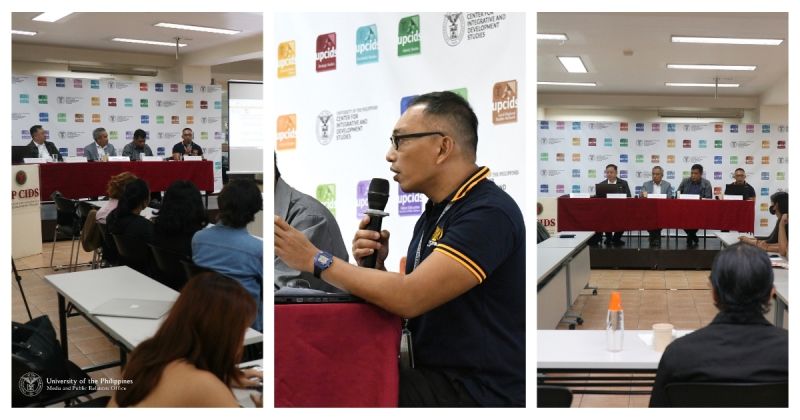PSPC holds roundtable on local government and election data set

Photos: PSPC conducted a Roundtable Discussion on the Philippine Local Government Election Dataset Project on July 31 2024, at UP CIDS, located on the Lower Ground Floor of Ang Bahay ng Alumni, UP Diliman | Taken by Kevin Roque of UP MPRO
The Program on Social and Political Change of UP CIDS held a roundtable that gave a glimpse of its Local Government Election Dataset Project on July 31, 2024 held at the UP Center for Integrative and Development Studies, Ang Bahay ng Alumni, UP Diliman, Quezon City.
Under Dr. Panao, PSPC is undertaking a significant data-driven project aimed at enhancing public understanding of elections and local governance. The project involves the creation of a comprehensive Local Government Election Data Set and an accompanying data analysis tool. This resource, which will be integrated into the UP Center for Integrative and Development Studies (UPCIDS) website, will provide metrics on local government structures, performance, and functions, thereby contributing to informed decision-making in the lead-up to the 2025 elections. Specifically, the Philippine Local Government Election Dataset Project, seeks to empower citizens and researchers by making electoral and financial data (1992-2022) readily accessible through a public dashboard. The beta version of this dashboard is expected to officially launch in November 2024.
The roundtable meant to solicit feedback on the dataset’s potential for research, its coverage, and strategies for enhancing accessibility and usability. The event commenced with a presentation by Dr. Rogelio Panao on retrospective voting. He elucidated how the dataset could equip citizens with the requisite information to make well-informed choices based on candidates’ track record and performance.
Additionally, Mr. Angel Averia, National Chairperson of the National Citizens’ Movement for Free Elections (NAMFREL), underscored the significance of a collaborative approach between civil society organizations and academic institutions to guarantee the accuracy and reliability of election-related data.
Dr. Christopher Mantillas, Associate Professor and Associate Dean of PUP’s Political Science and International Studies Department, discussed the potential of integrating the platform into the academic curricula, noting its value in analyzing electoral trends, local fiscal governance patterns, and the impact of policies on communities.
Professor Danilo Arao, convenor of Kontra Daya and a media expert from the UP Diliman Department of Journalism, emphasized the vital role of the media in disseminating information and influencing public discourse through effective communication of complex data.
The Q&A session covered research topics using the dataset, including disaster-related expenditures and comparative studies on the impact of the 1991 LGU code. Discussions also addressed making the dataset publicly available in various formats, partnerships with LGUs, and integration into the Philippines’ Open Data initiative.
In 2024, Dr. Panao took over the leadership of The Program on Social and Political Change (PSPC). He is Associate Professor at the Department of Political Science, UP Diliman. Dr. Panao’s expertise has played a pivotal role in enhancing the program’s research focus, particularly in the areas of elections and local governance in the Philippines.
Dr. Panao recently contributed to the discussion on proposed constitutional amendments during the Center for People Empowerment in Governance (CenPEG)’s 20th-anniversary public forum on March 17, 2024. In his presentation, he underscored the necessity of thoroughly evaluating the potential economic impacts, especially those related to Foreign Direct Investment (FDI), in any initiative for Charter Change (Cha-Cha).
His academic endeavors also extend to the study of political dynasties. At the symposium titled “Political Dynasties: Biyaya o Parusa?” held at the Law Center Institute of Government and Law Reform on May 24, 2024, Dr. Panao explored the socioeconomic and governance implications of political dynasties within the Philippine context.
Additionally, he served as a resource person at the “Democracy in Action: Embracing the Power of Choice” symposium on April 27, 2024, organized by Model United Nations – University of the Philippines Diliman (MUN-UPD). He also presented at the Philippine Political Science Association’s 2024 International Conference: Reimagining Margins, Reclaiming Borders, hosted at Mindanao State University-Iligan Institute of Technology in Iligan City from May 2-4, 2024.
PSPC, under its current leadership, strives to advance the discourse on elections and socio-political issues in the Philippines. It is dedicated to organizing public forums and pursuing collaborative research initiatives that promote a thorough and constructive examination of key social and political changes shaping the nation.
PSPC is one of the Research Programs of the UP Center for Integrative and Development Studies, the University of the Philippines’ policy research unit. Learn more and download FREE policy papers from the PSPC.